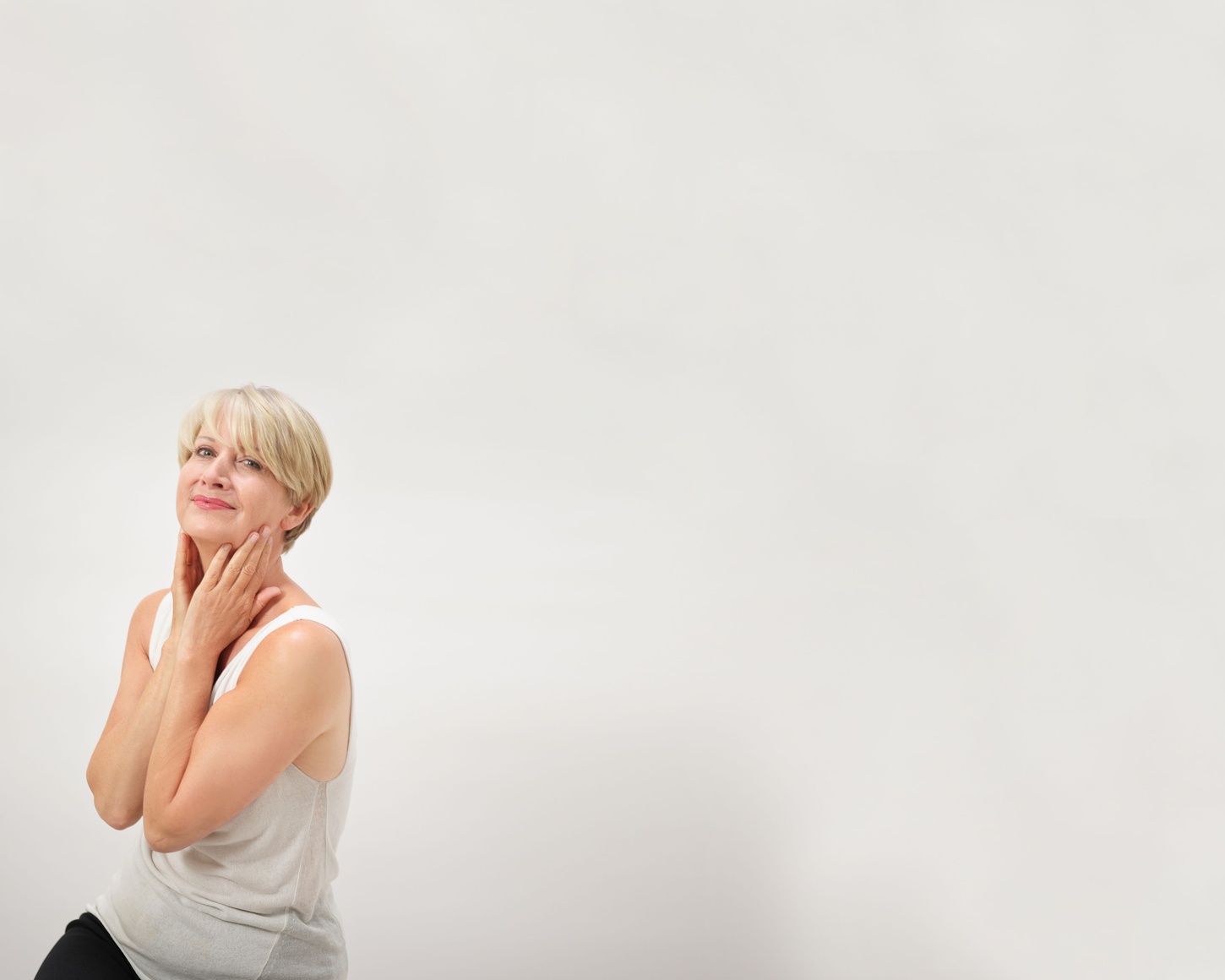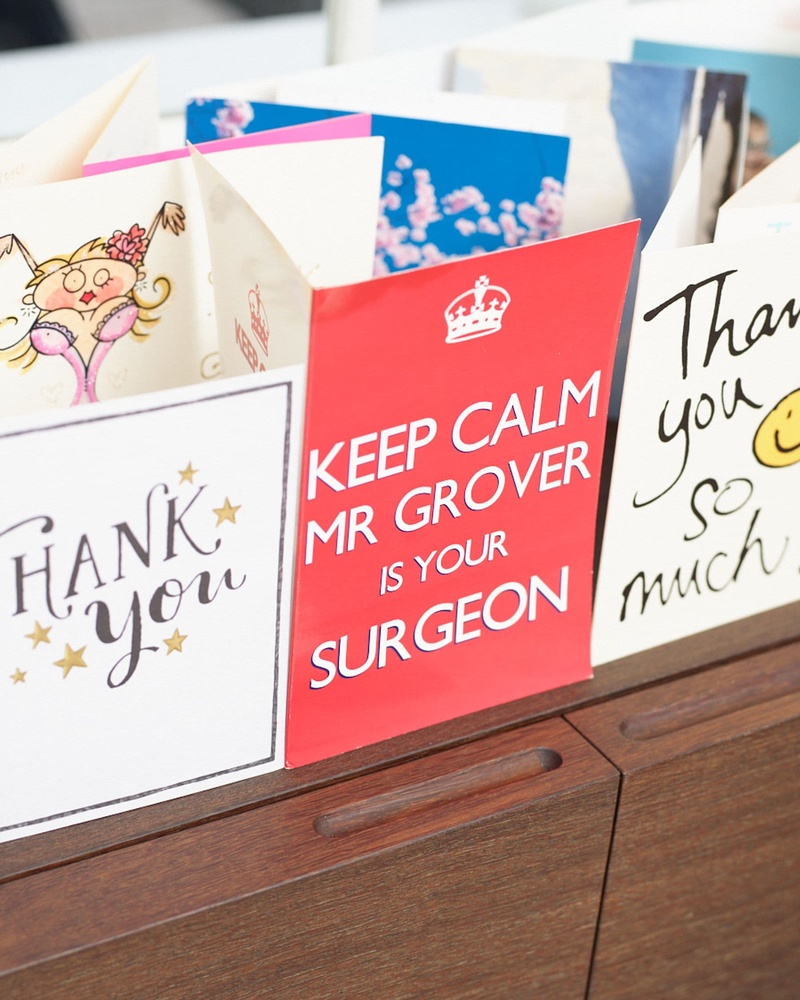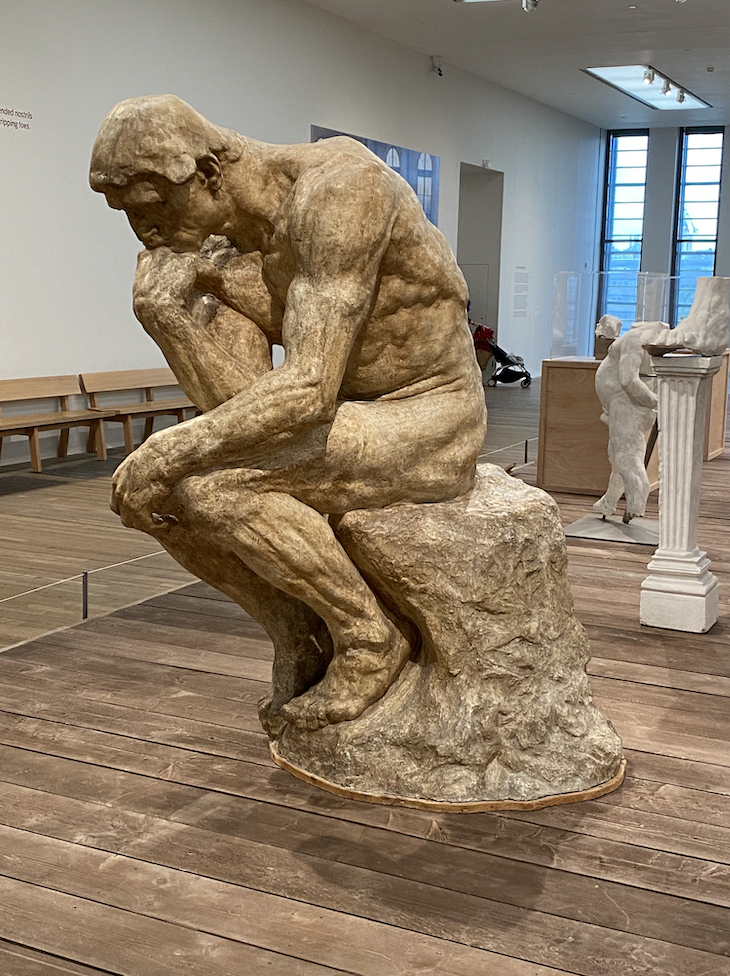Having a facelift is a journey both physical and emotional. Each person is unique so their journey and recovery will be unique also. For the successful outcome of any process, preparation is key. Mr Grover’s phrase that when it comes to the detail of facelift surgery everything matters, applies to preparation for a facelift as much as to the surgery itself. The following suggestions are providied to help patients who are preparing for deep plane face and neck lift surgery. There will be typical examples of facelift recovery illustrated. Please note that each patient’s journey is unique so this is purely a guide and not suggested as a comparison tool.
A boutique practice focussed purely on facelift surgery, blending artistry with compassion
INTRODUCTION
Contents:
Pre-operative checklist timeline
One Month Before Surgery
Stop drinking alcohol as this has a blood thinning effect. Avoiding alcohol will reduce your risk of bruising and swelling following surgery which enhances recovery.
Two Weeks Before Surgery
Stop all Vitamins and supplements as well as Aspirin and non-steroidal pain killers such as Brufen, Nurofen, and Voltarol etc. Again, by avoiding these you reduce your risk of bleeding and bruising with surgery. Please note – so potent is the risk of bleeding with these drugs that Mr Grover has cancelled patients before surgery if they have neglected to omit blood thinners for two weeks.
The Preadmission Assessment. The Hospital where Mr Grover operates, The London Clinic, will contact you during the two weeks leading up to your surgery to arrange a Preadmission Assessment. This is a health check either in person or by phone if you live at a distance. The results of this are relayed to Mr Grover’s Anaesthetist before your admission. This is a service that is included in your package by The London Clinic so there is no extra charge.
One Week Before Surgery
If you colour your hair, please do so approximately a week before surgery. You will be able to colour again about 4 weeks after surgery.
Shopping List Before Facelift Surgery:
- “V” Pillow from John Lewis. These help you to sleep slightly elevated after surgery and reduce the chance of turning to the side.
- “Simple” facial wipes. These not only help clean the face but also contain moisturiser.
- Comfortable front fastening garments to wear after surgery (cardigans or zip up tops). This will allow removal without going over the head which could risk catching on your ears.
- Fan to keep the room cool post-surgery especially if your surgery is in the summer.
- Subscription to Netflix along with selection of books and magazines
- Stock up on food and consider some ready meals.
Please do not use neck travel pillows (as used on airline flights). These cause pressure on the neck which is best avoided.
Day before Surgery
Stock up on plenty of ice in the freezer so that you have this readily available following your return from the hospital. It will be needed for the cooling flannels which Mr Grover will recommend once you are back home. How these are applied will be explained to you in hospital before you leave by Mr Grover.
Prepare your overnight bag (two nights). Nightwear will be provided but you might prefer your own pyjamas. You will need a bathroom bag with toiletries and “Simple” facial wipes. Loose comfortable clothes for two days (tops should be front fastening). Laptop or iPad for entertainment and your mobile phone plus charger.
Keep yourself well hydrated during the day and up to the time you sleep (i.e. before midnight) – drink extra water the day and evening before surgery so the period of nil by mouth after midnight does not dehydrate you.
Evening before Surgery
Wash your hair thoroughly using your regular shampoo so that your hair and scalp are squeaky clean before surgery.
Remove all makeup
Please remove jewellery including bracelets (esp. Cartier love bracelets – the hospital do not have the appropriate screwdriver to release these for you and there should be no panic in the morning). You may wear your wedding ring.
Please remember you must not eat or drink anything at all after midnight the night before surgery regardless of what anyone tells you.
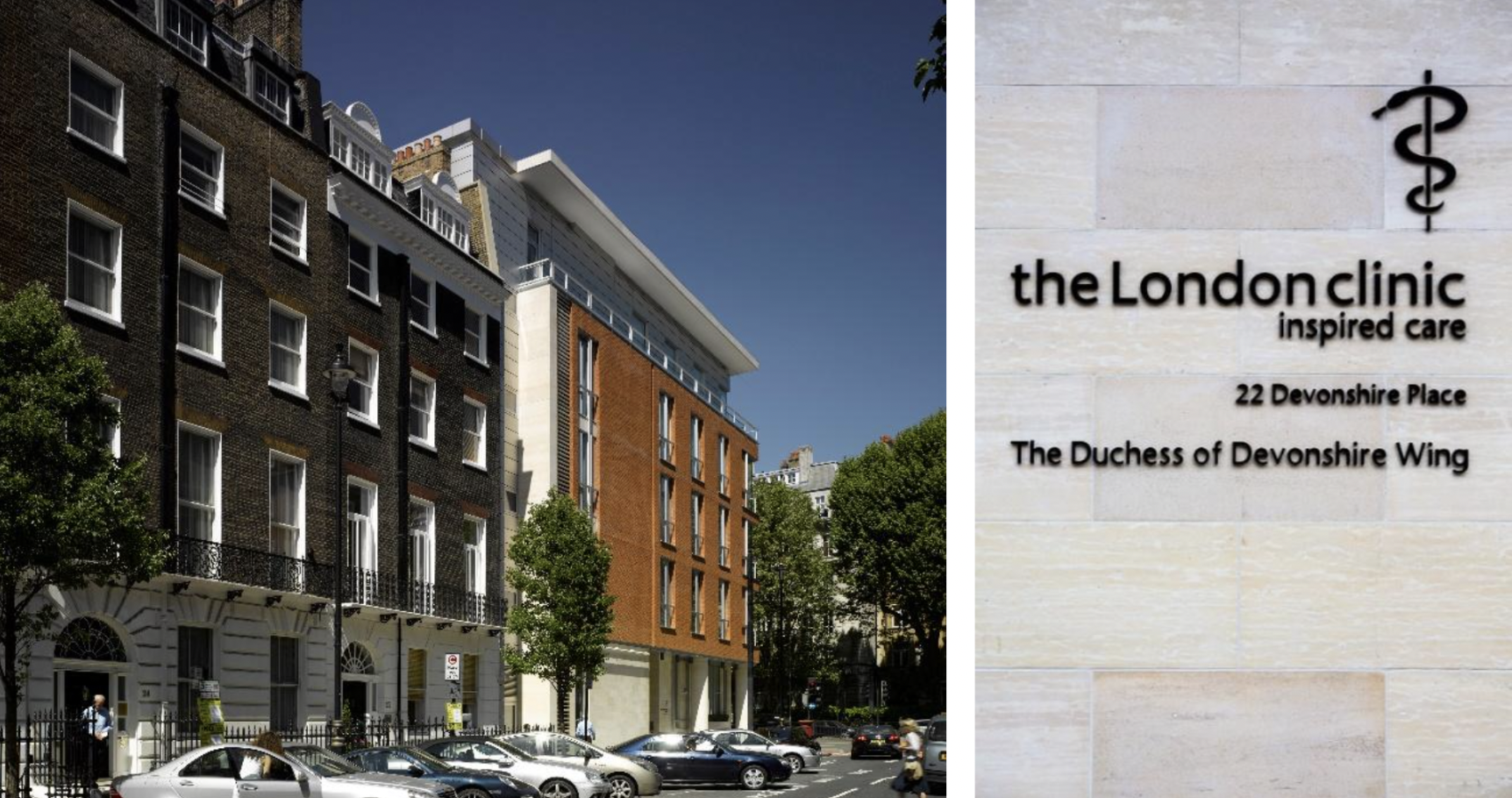
Arriving at The London Clinic in Devonshire Place Marylebone at 6.15-6.30am before surgery.
Morning of Surgery
Come to the hospital makeup free. Makeup on the skin at the time of surgery is an unnecessary infection risk. Mr Grover will clean your face prior to surgery but still please avoid make up and especially eye makeup as this can lead to granules of mascara or eyeliner falling into the eye whilst you are asleep potentially risking a corneal abrasion.
Allow enough time to get to the hospital by 06.15-06.30 at the very latest.
Finally – Please remember the phrase on one of Mr Grover’s thank you cards:
Keep calm,
Mr Grover is your surgeon
Preparation for a smooth recovery period
Housekeeping.
No housework allowed so make adequate preparations please. If you have a housekeeper then they need to be on red alert for two weeks to help out. No problem if you live alone but you need to organise before surgery so that all housekeeping issues (shopping, cooking cleaning etc) are totally sorted.
Work.
Make sure you have delegated any work commitments and allowed yourself a good recovery period so you can relax and recover stress free for two weeks. Please remember that after surgery You need to allow for complete rest.
Family.
Make sure your family know all about your plans for surgery and have them on side. It is good to have family on board to support you although many patients post facelift live alone and that is no problem with careful preparation. If you have dependents then you need to plan for their welfare after surgery (e.g. elderly relatives, children, dogs, and horses)
Avoiding Boredom.
You will not be out shopping in Harrods or meeting friends for lunch at Scott’s in Mayfair. Please prepare yourself for staying in and taking things easy. Subscribe to Netflix and download some good programs to watch. Have plenty of magazines and books. Make the most of this quiet time, it will not last. Mr Grover’s teenage daughters would describe the strategy as “Netflix and chill”.
NETFLIX and CHILL
Key points for emotional recovery
Positivity.
There is no doubt that patients who are well motivated for their facelift have a smoother recovery. In a sense you need to be “up for it”. Those who are overly nervous and google every possible issue seem to tempt fate. If Mr Grover thinks you are not emotionally ready, he will always dissuade you from surgery so do be honest with yourself and be sure you are genuinely “up for it”.
Patience.
The healing and recovery process takes time. In the words of the sculptor Auguste Rodin – “Patience is a form of action”. Therefore you can take control of this because patience is not passive, you can do it actively.
Trust.
Trust in the “process” of recovery which takes its own time and everyone is individual so please don’t compare with others as your journey is unique and there is “no normal”.
Trust in the “team”. Rajiv and his team specialise exclusively in facelift surgery so trust them to help and advise you, they genuinely want the best outcome for you.
Patience is a form of action
– Auguste Rodin
Post-operative recovery timeline
In Hospital (1-2 days)
A light dressing will be applied at the end of the operation which remains in place overnight. You will be nursed in a semi-sitting position immediately after the operation which helps to reduce swelling. There is not usually much pain or discomfort although there is often a tight feeling in the neck which settles within a few days. On the day after surgery, the dressings will be removed by Mr Grover, and your hair will be washed by the nurses after which you have a quiet day resting and relaxing. To help reduce swelling you will be encouraged to put cool pads soaked in iced water on the face. The nurses will assist you with this. You will leave after two nights, and Mr Grover and his team will visit each day to check on you and ensure you know exactly what to do whilst recovering at home to get the best outcome. You will not need to wear any bandages or garments when you leave hospital.
The light dressing that you wear for the first of your two nights has drainage bottles held within. During the surgery, some saline is injected in the face which also contains fluids to help reduce bruising and swelling. It is these fluids that come out into the drainage bottles overnight. Research performed by Rajiv has proven that the use of these drains significantly reduces bruising and swelling and fortunately they easily come away as the bandage is removed. Mr Grover always removes the dressings himself and does not delegate this to anyone else. When the bandage is removed your hair may look matted slightly into a ballerina style as gel is used in theatre to keep it out of the way. After a hair wash it will look like it did before. On the first day it is not unusual to have a tight feeling in the neck but usually no real pain as such. The tight feeling in the neck improves over coming days and is usually not too uncomfortable at any stage. Swelling usually increases over the first 2-3 days but it is not unusual in some patients to have their maximum swelling the day after surgery coupled with a flushed appearance in the cheeks. This improves with the application of the cool pads and by the next morning is usually gone.
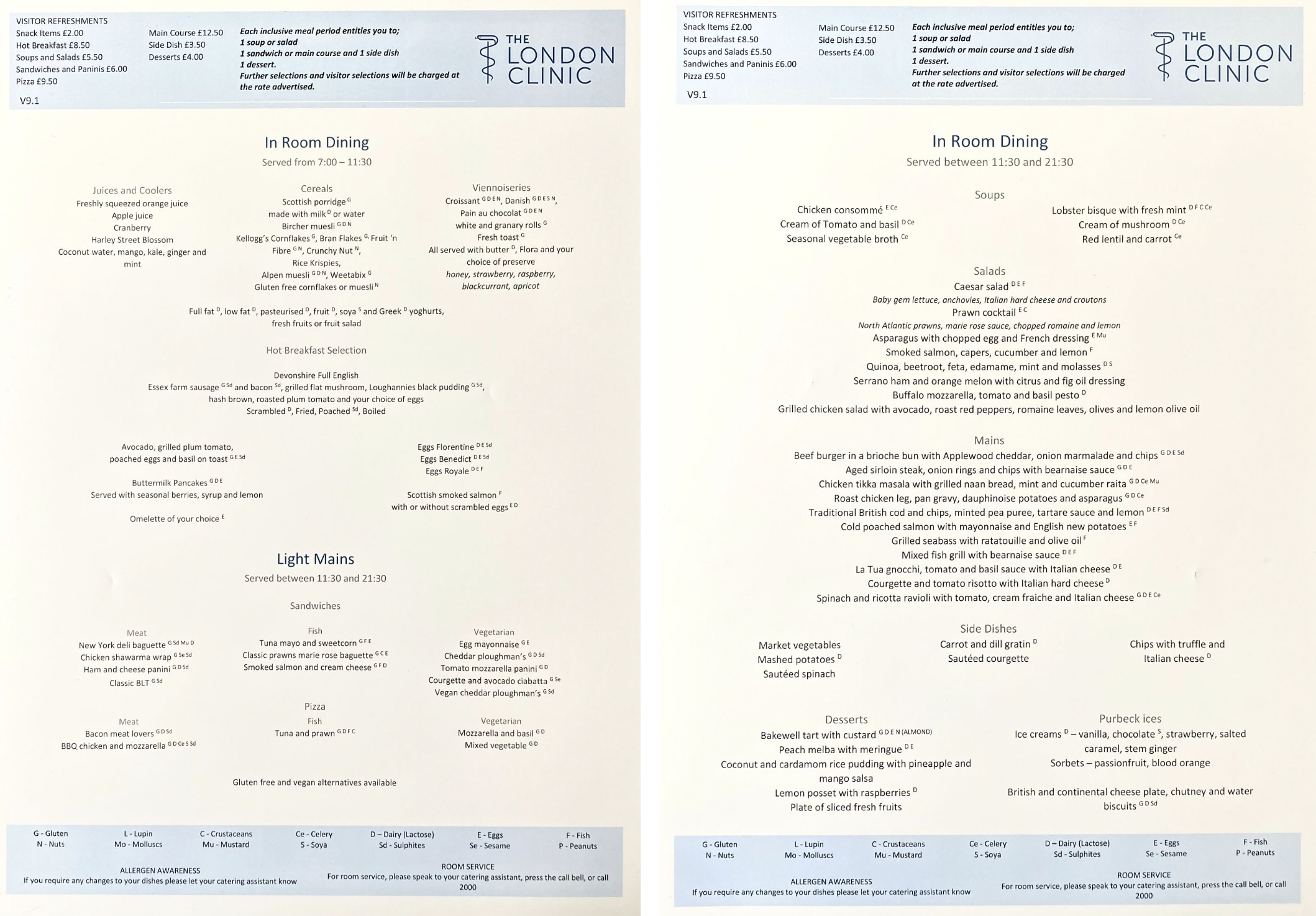
The London Clinic offers a full a la carte menu with soft options and also caters for all common food allergies.
At home (2-14 days) – “Netflix and Chill”
It is essential to rest for the first 10-12 days, pottering around the house and watching Netflix but not really going outdoors. Swelling will tend to increase during the first 2-3 days after surgery (this is normal) and then subside over the next 2-4 weeks. Usually, 50% down by 2 weeks and 75% down by 4 weeks. It is helpful to rest/sleep with three or four pillows after surgery in order to encourage swelling to subside more quickly. It is helpful to keep the face cool using iced water soaked hand towels as you did in hospital (hence the title – Netflix and Chill). Make sure you are well hydrated but don’t force yourself to drink excessively. This is not the time to be drinking two plus litres of water each day in the hope of ‘Detoxing’ the system. The brain releases a hormone after surgery which tends to retain water (Antidiuretic hormone – ADH), so if you drink more fluid than you need, it will be retained, causing more swelling.
It is important to avoid bending forwards because this will aggravate facial swelling as will carrying anything heavy. Please limit what you pick up to 5kg (equivalent to a full kettle in each hand). It is better to avoid washing hair in the first week however this will be done by the nurses before leaving hospital and can then be repeated after 6-7 days (instructions will be provided). You should also avoid very chewy foods and avoid talking a lot as both these activities exercise the face, which can aggravate swelling.
After a week Mr Grover will arrange to see you in Harley Street for a check and possibly to remove any stitches near the eye if blepharoplasty was performed. He will see you again at between 10-14 days to remove the remaining facelift stitches. Facial and eyelid stitches run beneath the skin and are not visible except at either end. They will therefore not leave stitch marks so do not worry.
From 2-6 weeks after surgery
The cheeks and ears will feel numb which is normal. Soft feelings of sensation return by 2-3 months, but it may take 12-18 months for normal sensation to return. In general, it is best to continue with your usual facial skin care regime as the risk of sensitivity to a new product is best avoided. Please avoid putting any skin products near your scars and also avoid hair colouring till 4 weeks after surgery. Skin creams in contact with your scars before 4 weeks can cause an infection.
Please avoid driving for the first two weeks after surgery or until such time as your neck movements are comfortable. Most patients can return to work after 2-3 weeks although you may wish to avoid social events till after 3 weeks when much of the fine swelling has settled. You may resume gentle sporting activity at 4 weeks building up to full cardio exercise and weights by 6 weeks. Performing heavy exercise prior to that can cause prolonged swelling.
Ann P recovery journey after Deep Plane Face and Neck lift
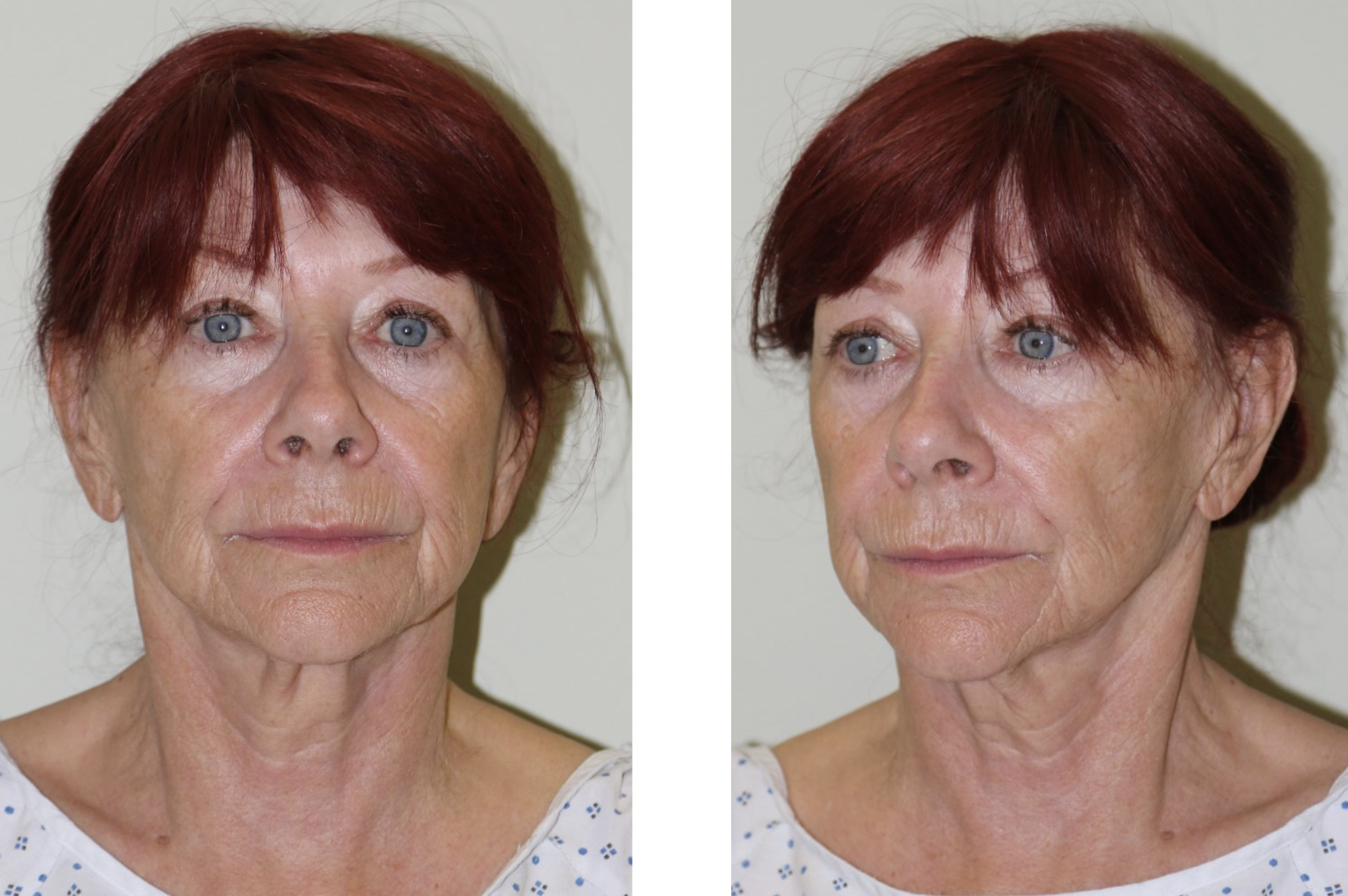
Anne P – Preoperative appearance on the morning of surgery – Age 72.
She underwent Deep Plane Face and Neck lift with Anterior Platysmaplasty using TIVA light general anaesthetic to reduce bruising and swelling and accelerate recovery.
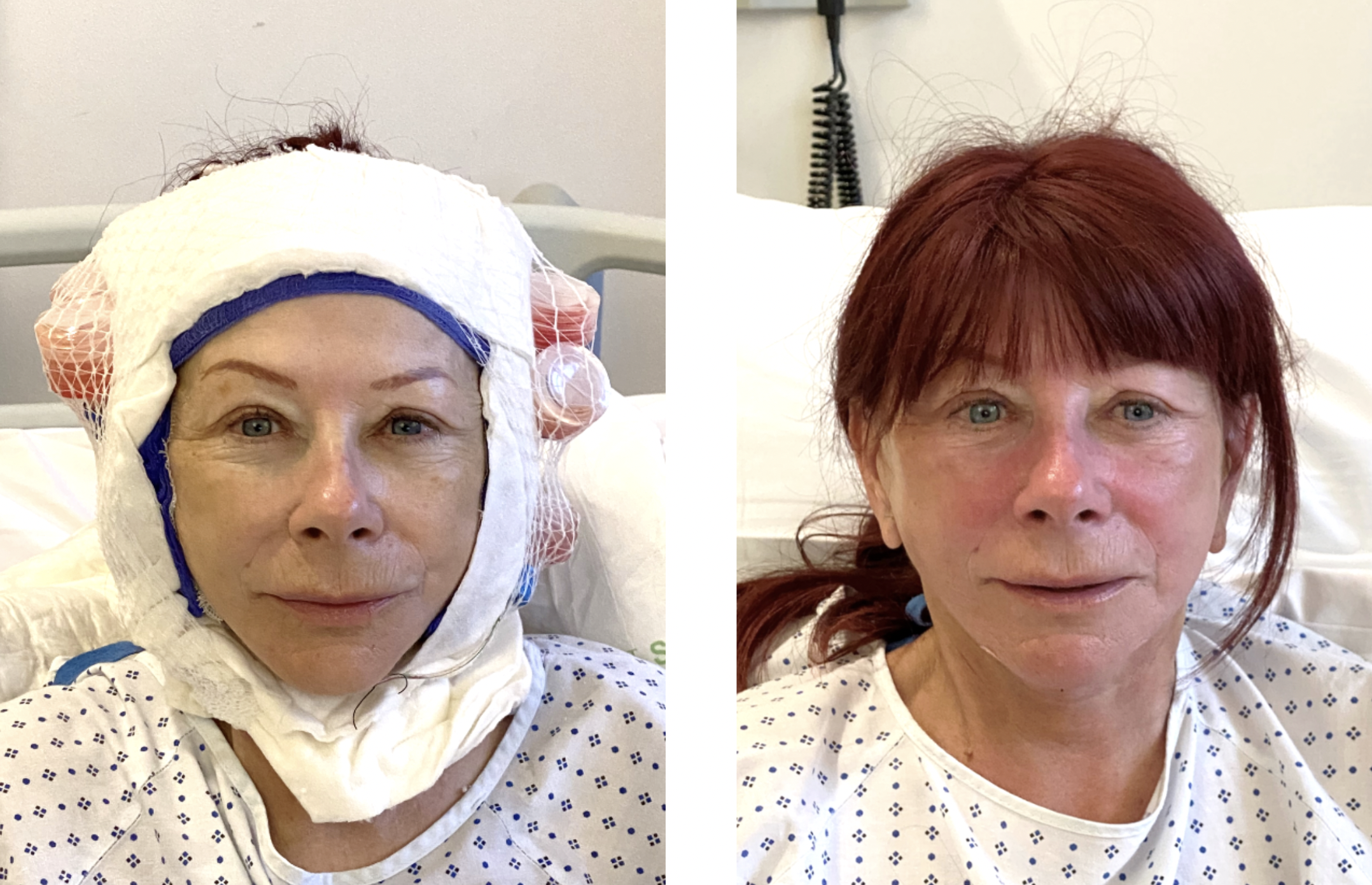
Anne P on the evening of surgery (Left) with her dressing on and then on Day 1 after surgery (Right) with dressings removed and a hair wash.
Note her flushed cheeks which is normal on the Day 1 after surgery and settles with cool pads by the next morning.
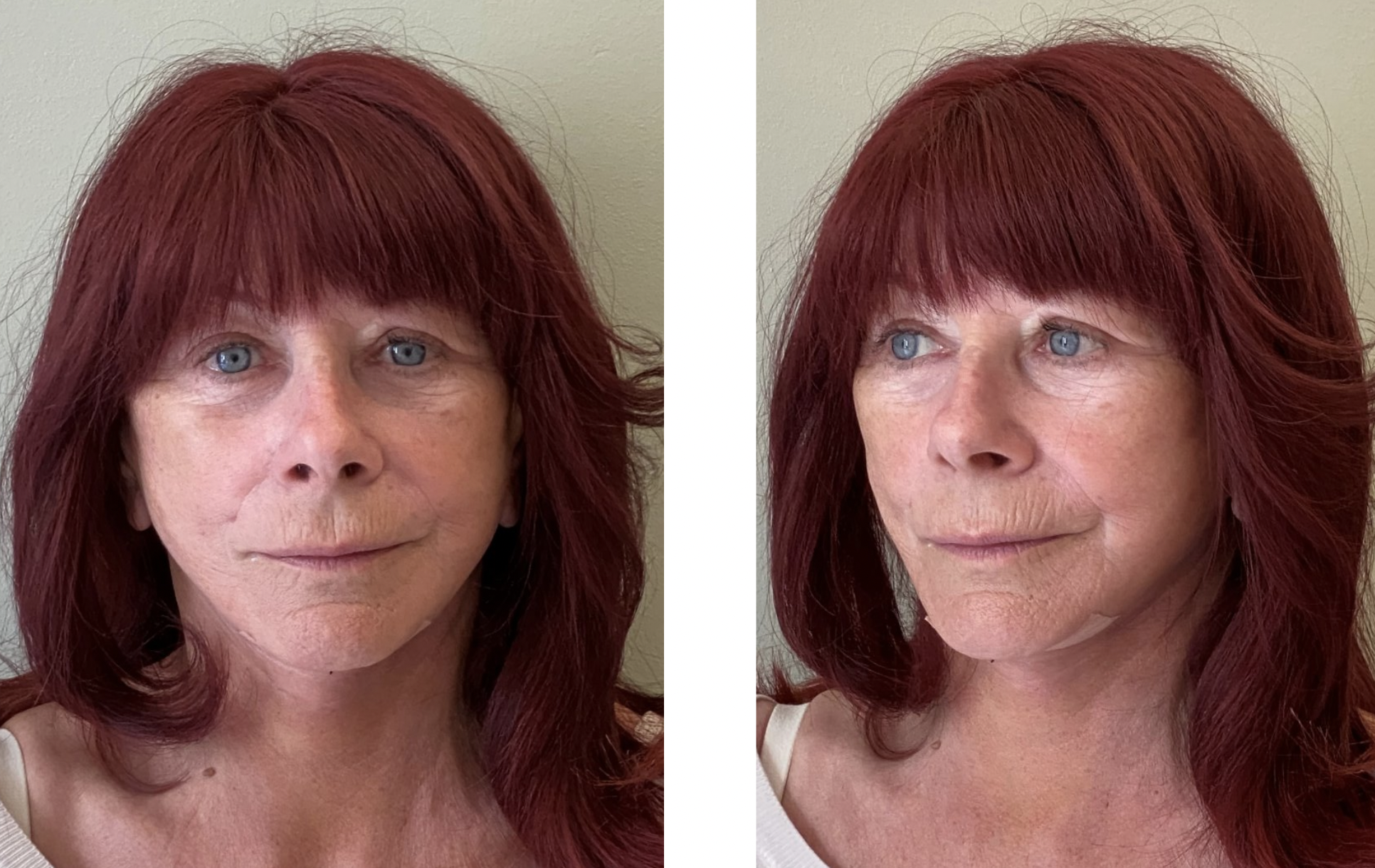
Anne P Two days after surgery about to leave hospital.
Mr Grover applies a small flesh coloured tape under the chin for the first five days which is easily removed when you visit him for your first post-operative visit. There is a little more swelling by Day 2 which is normal and may continue to increase till Day 3-4. Typically, there is very little bruising with Mr Grover’s Deep Plane Technique but a little swelling is normal.
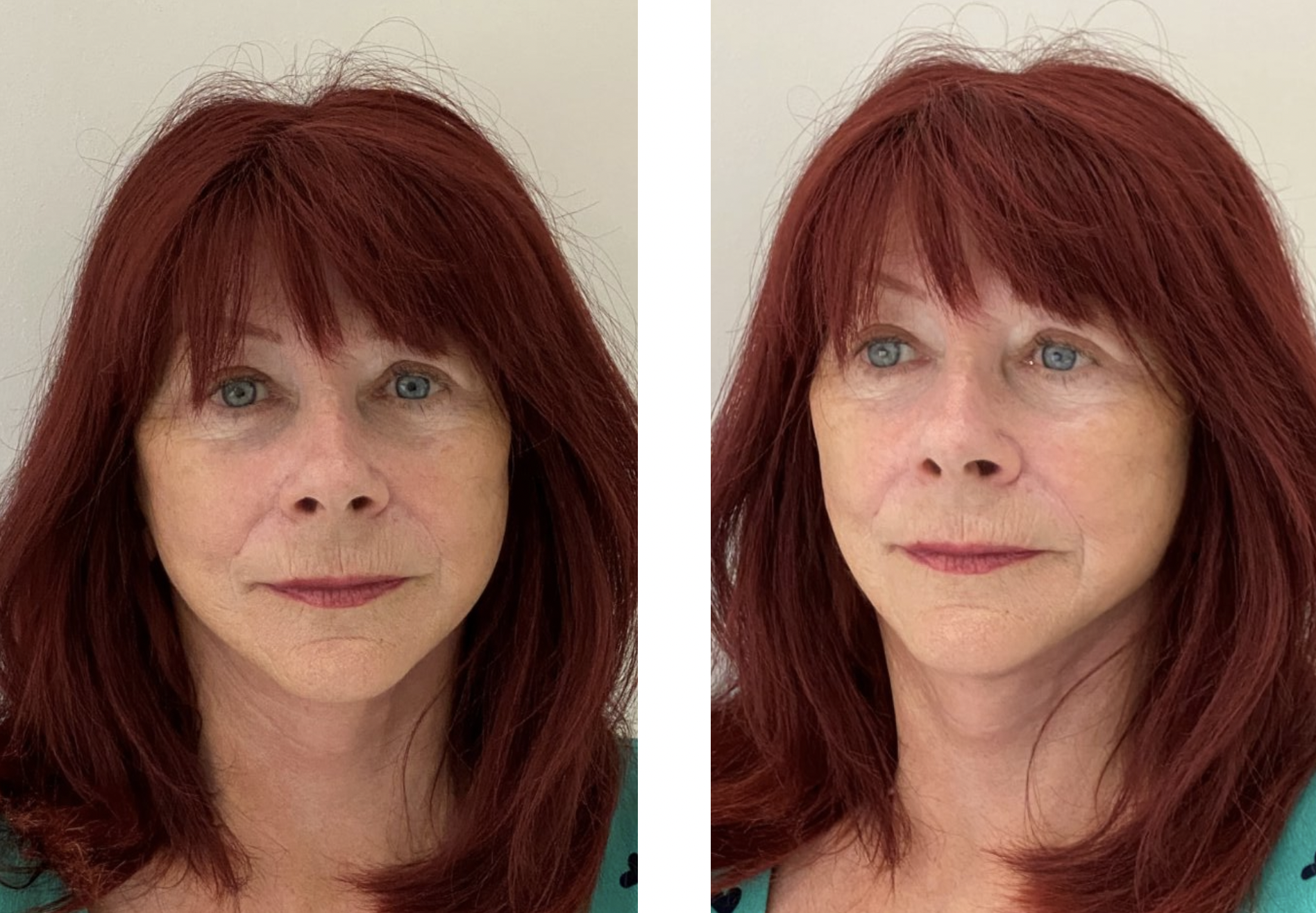
Anne P 12 Days after surgery on the day she came for suture removal.
Swelling is settling well however she will look even better in a week or two. Although Mr Grover would still advise not to go for long walks or take exercise Anne could easily go out and about without anyone knowing. In fact, she went out shopping to Selfridges!
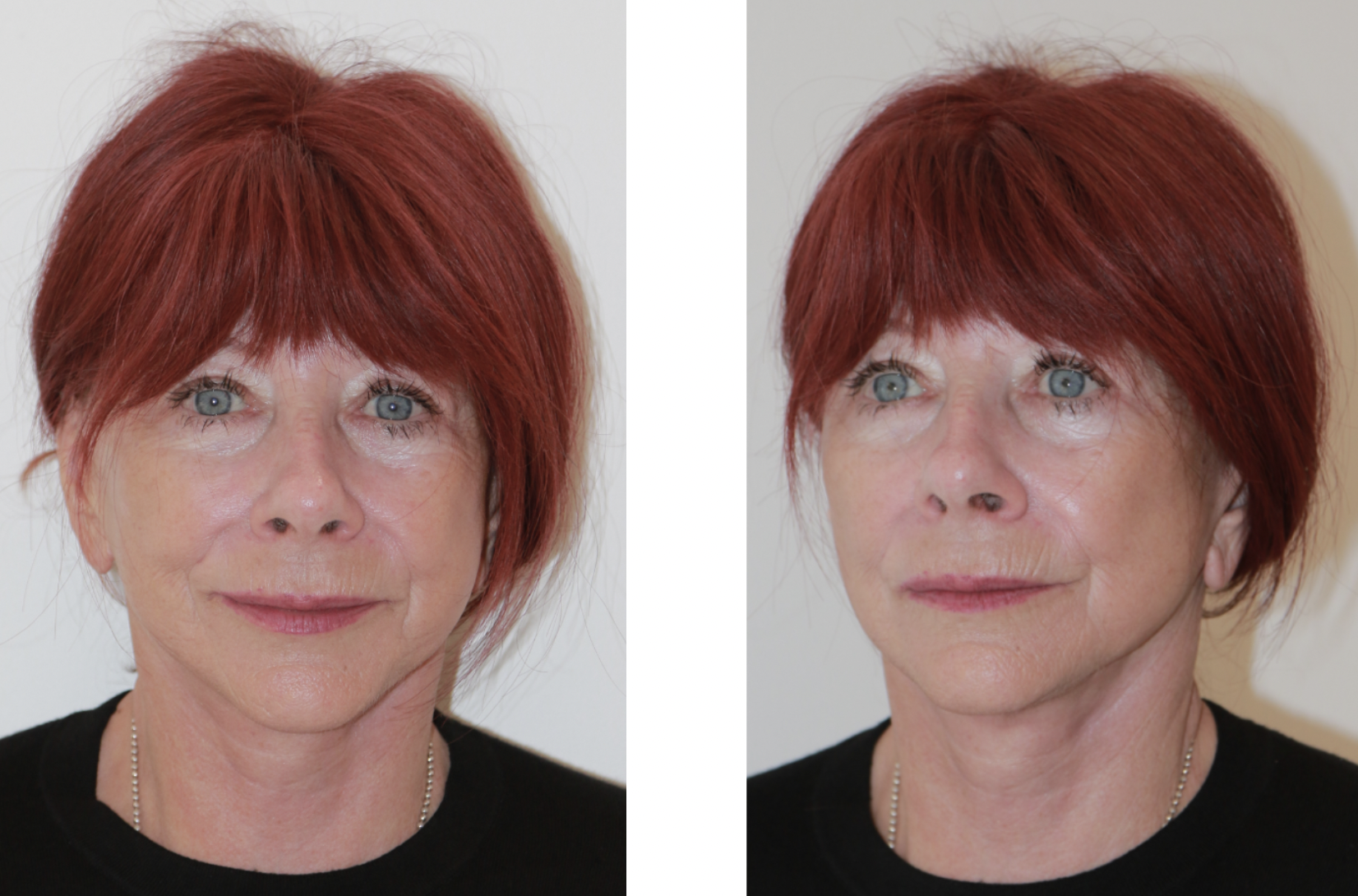
Anne P 3 Months after her operation and no visible signs of surgery. Face and confidence both restored!
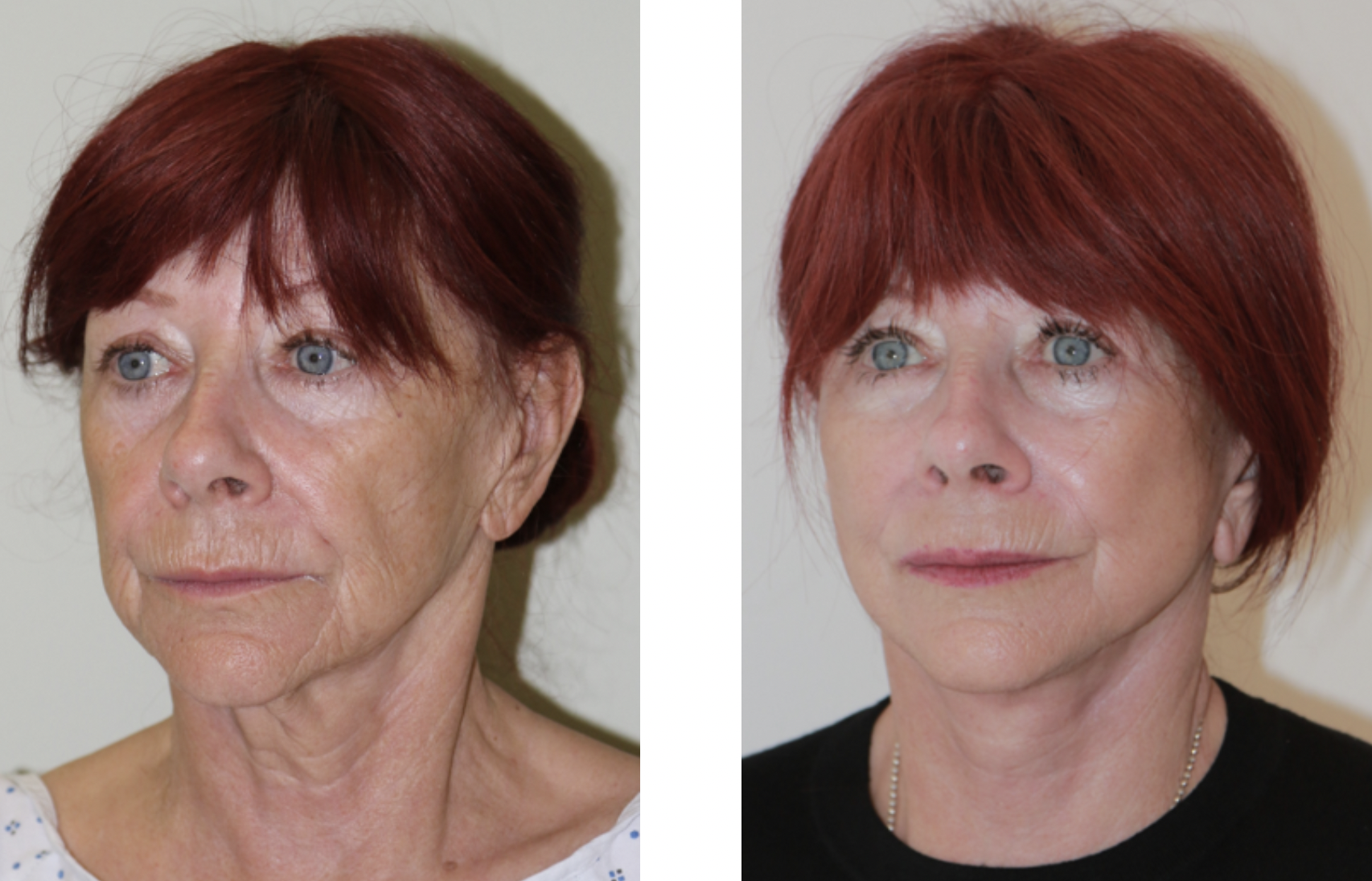
Anne P before and after surgery with side by side comparison Age 72.
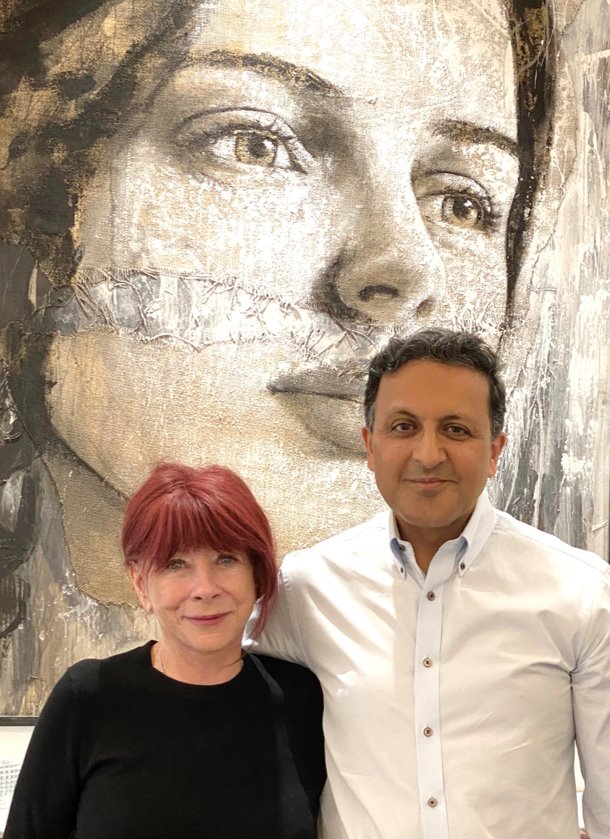
Anne P at 2 months after surgery delighted with her outcome and so was Rajiv.
Tracy O recovery journey after Deep Plane Face and Neck lift with Blepharoplasty
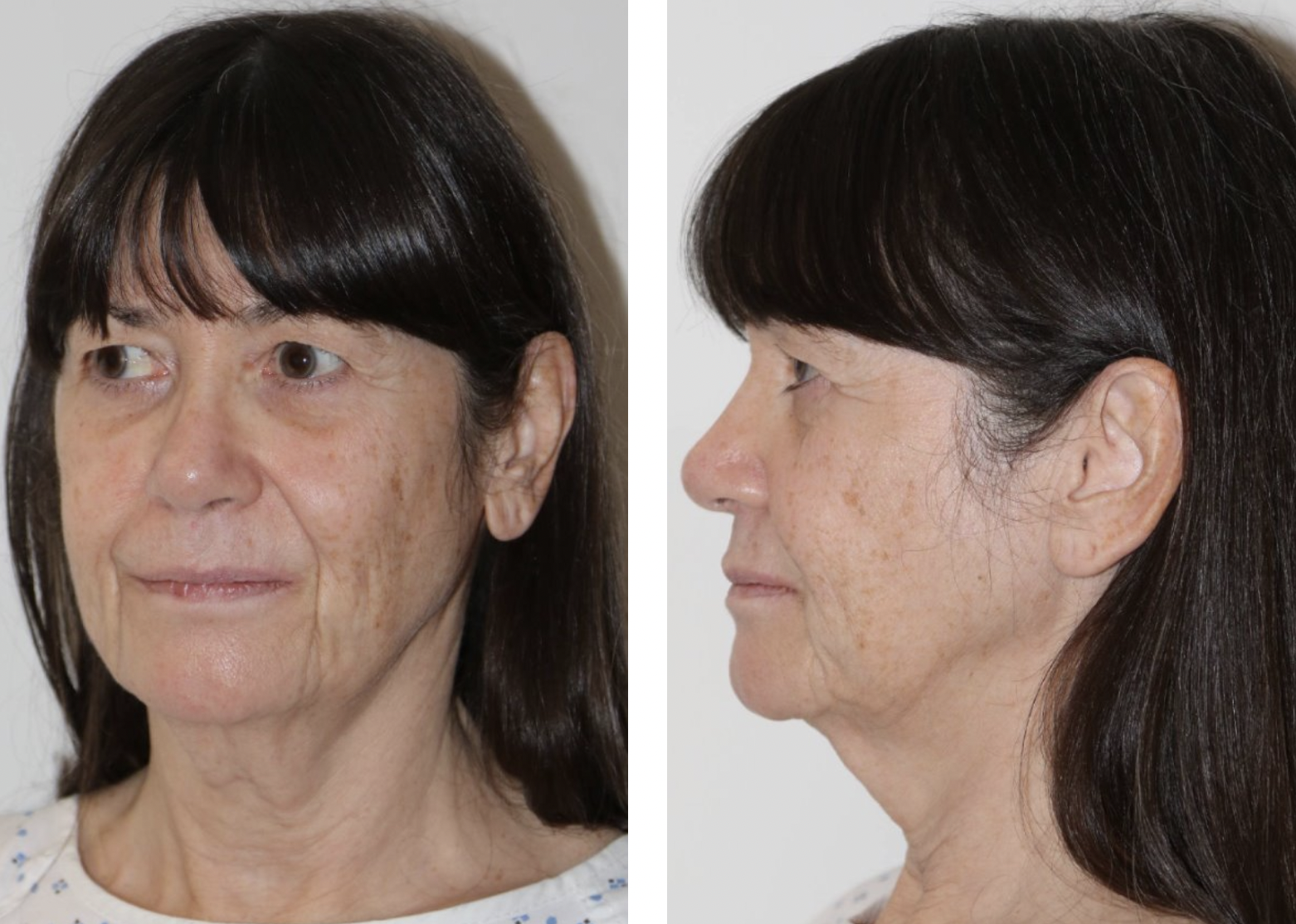
Tracy O - Preoperative appearance on the morning of surgery – Age 61.
She underwent Upper Blepharoplasty, Deep Plane Face and Neck lift with Deep Neck Reduction and Anterior Platysmaplasty using TIVA light general anaesthetic to reduce bruising and swelling and accelerate recovery.
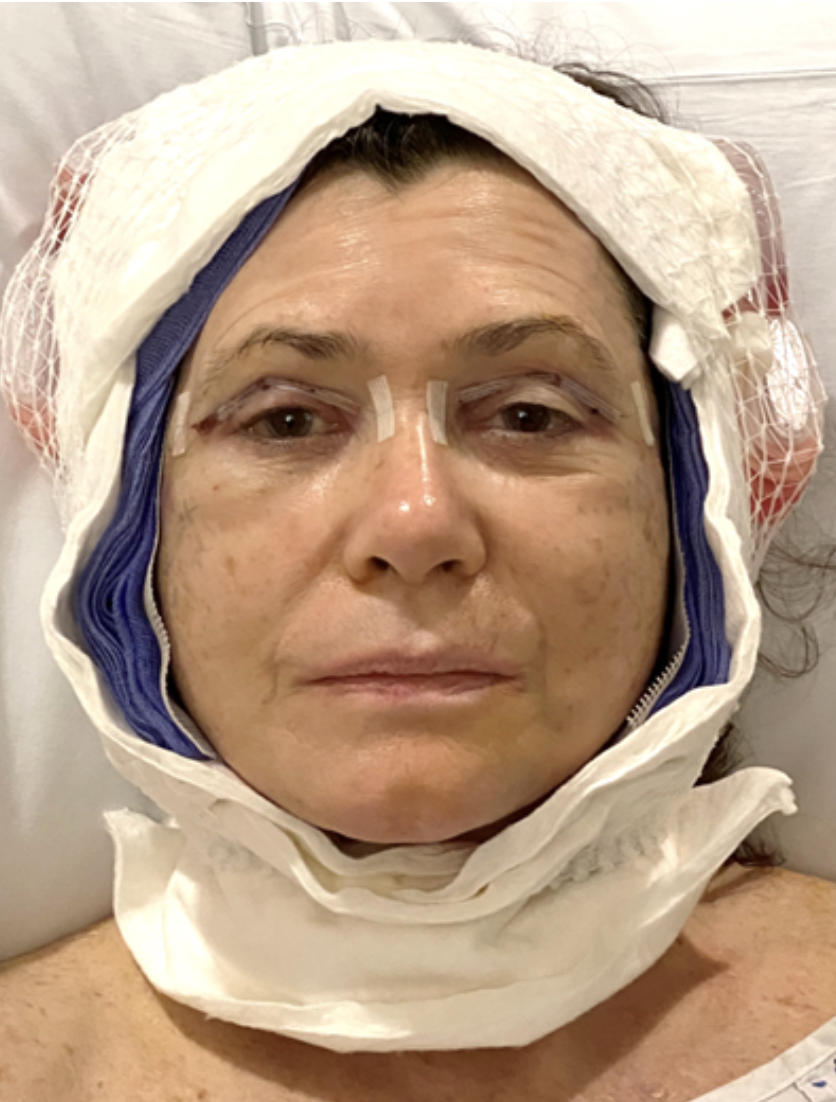
Tracy O - on the evening of surgery with her dressing around the face which is kept on for less than 24 hours after which there are no dressings or bandages.
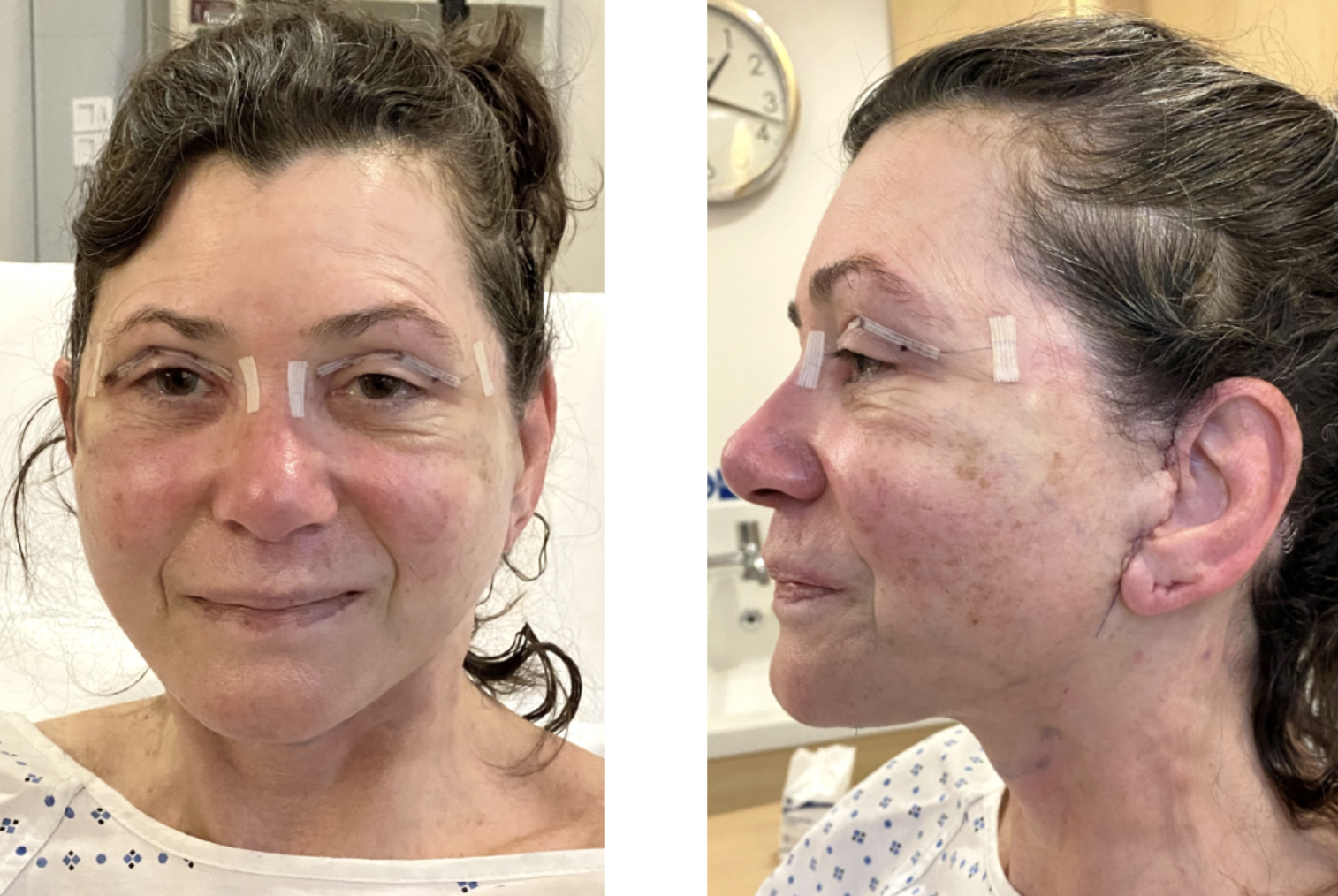
Tracy O - on Day 1 after surgery literally just after the dressings were removed and before her hair wash.
Note her flushed cheeks which is normal on Day 1 after surgery and settles with cool pads by the next morning. The improvement in the neck contour is immediately apparent.
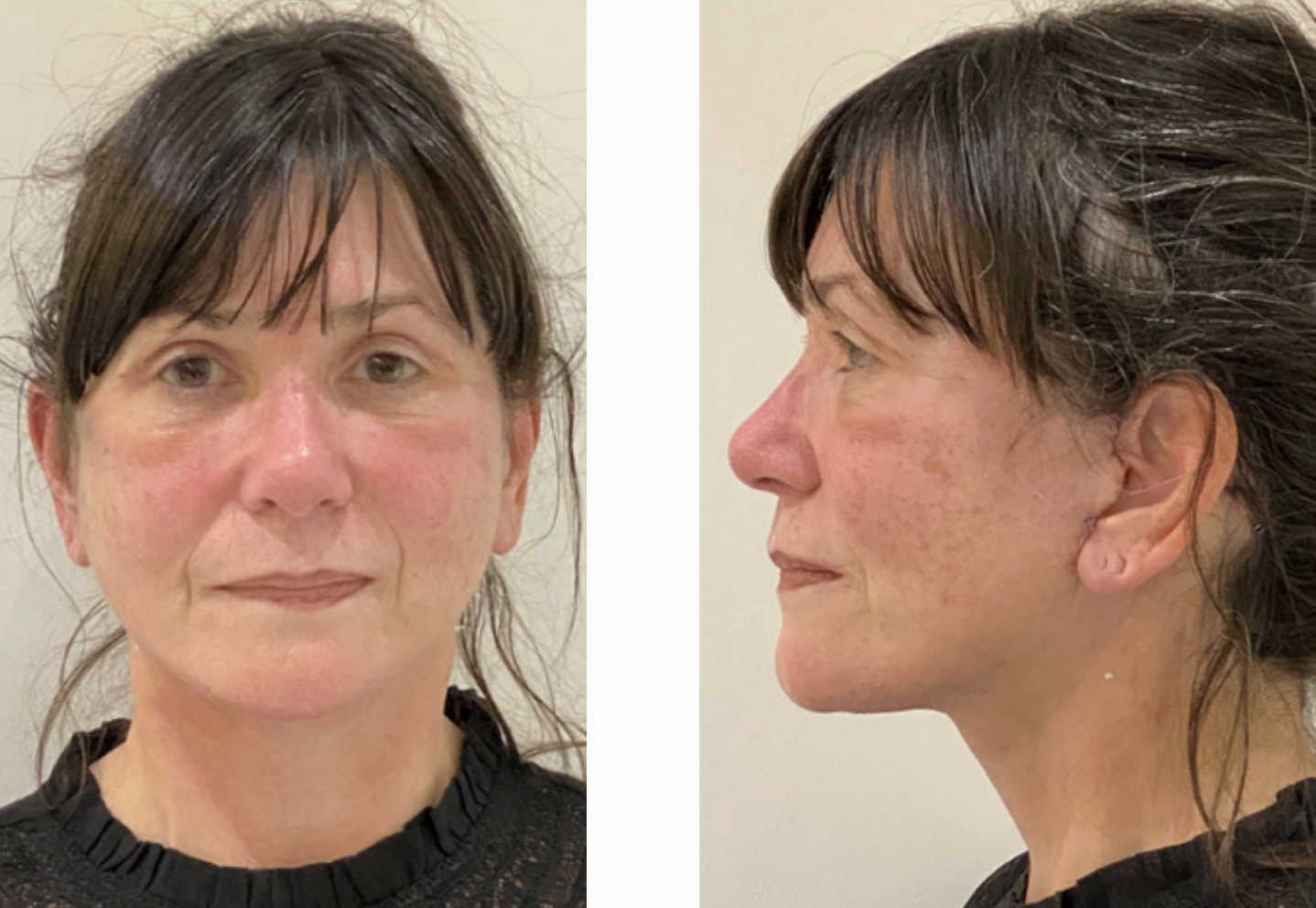
Tracy O - 6 Days following surgery and just after she had suture removal from her eyelids.
Swelling is settling well however she will look even better in a 2-3 weeks. Typically, there is very little bruising with Mr Grover’s Deep Plane Technique but a little swelling is normal. After having a hair wash in hospital following surgery, Mr Grover advises avoiding hair washing in the first few days till you see him at 6 days when he provides detailed instructions how you can wash your hair thereafter. Tracy was looking forward to going home and giving her hair a good wash whilst continuing with another week of Netflix and Chill until all her facelift stitches were removed at 13 days.
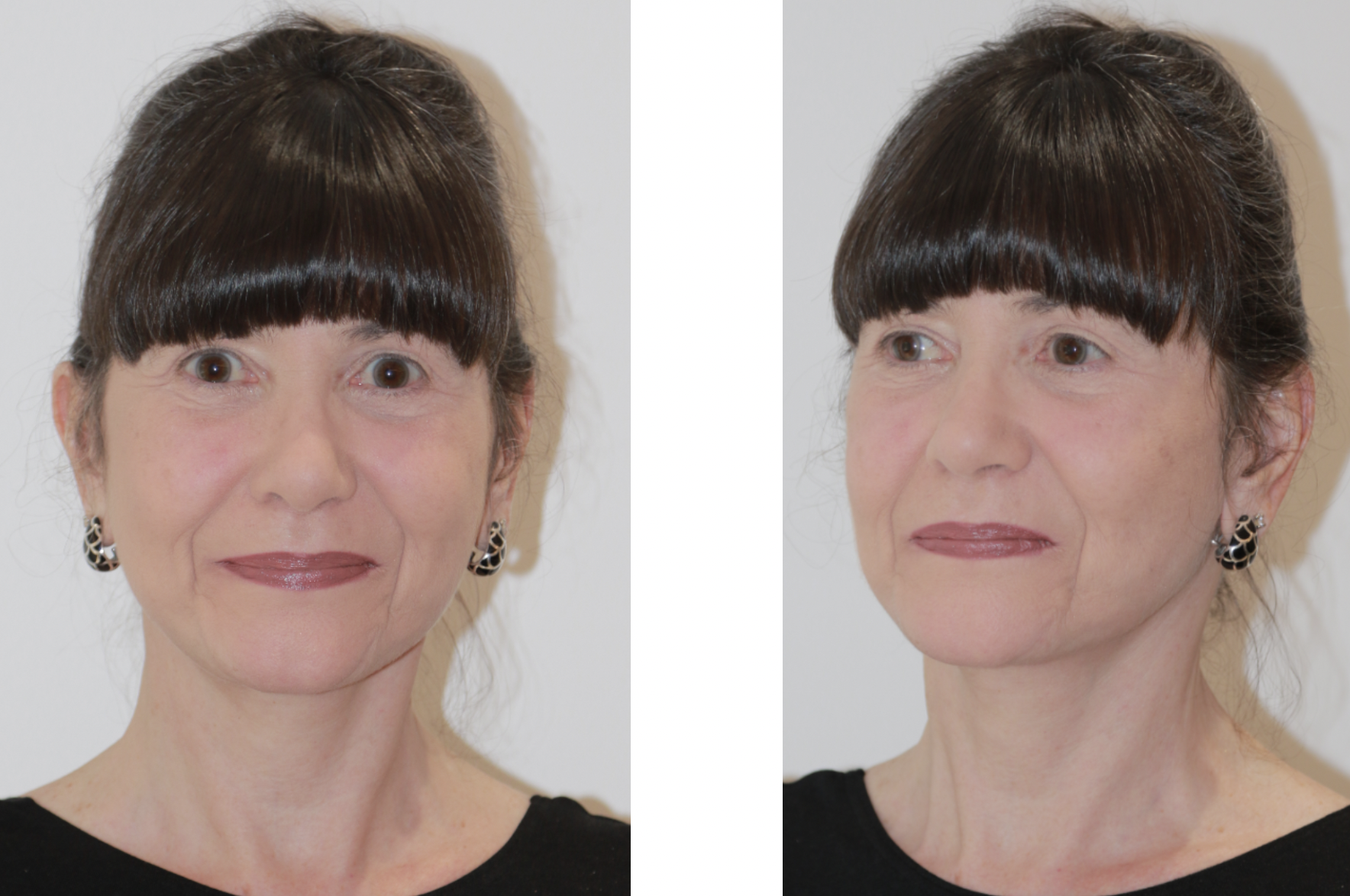
Tracy O - 13 Days after surgery on the day she came for facelift stitch removal.
Swelling is settling well however she will look even better in a week or two. Although Mr Grover would still advise not to go for long walks or take exercise Tracy could easily go out and about without anyone knowing she had undergone a facelift. She really wasn’t supposed to be wearing earrings at this stage as Mr Grover advises against this till 6 weeks but she was visibly excited and there was no stopping her. Viewers at home, please don’t do this.
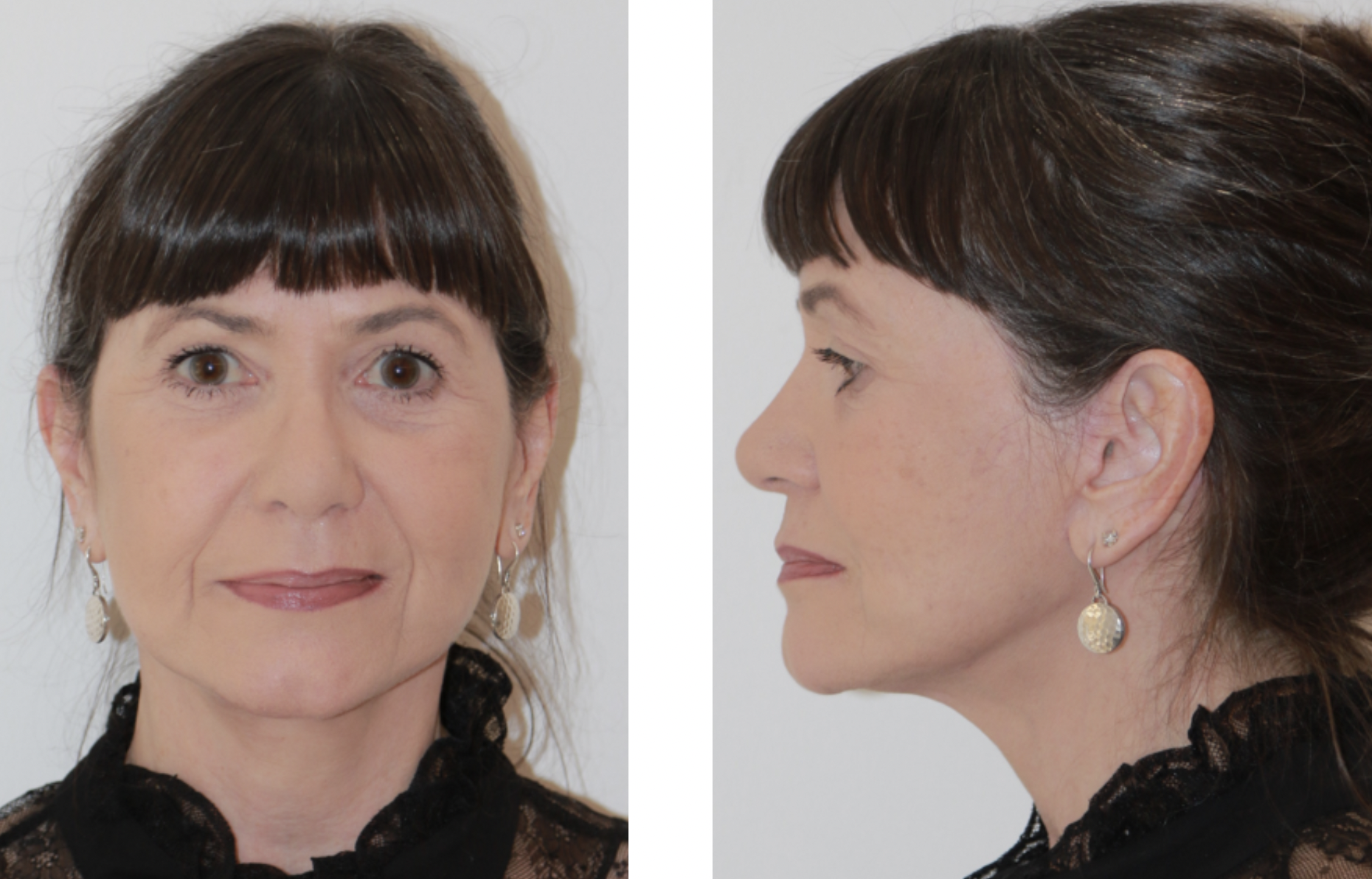
Tracy O - 3 Months after her operation and no visible signs of surgery.
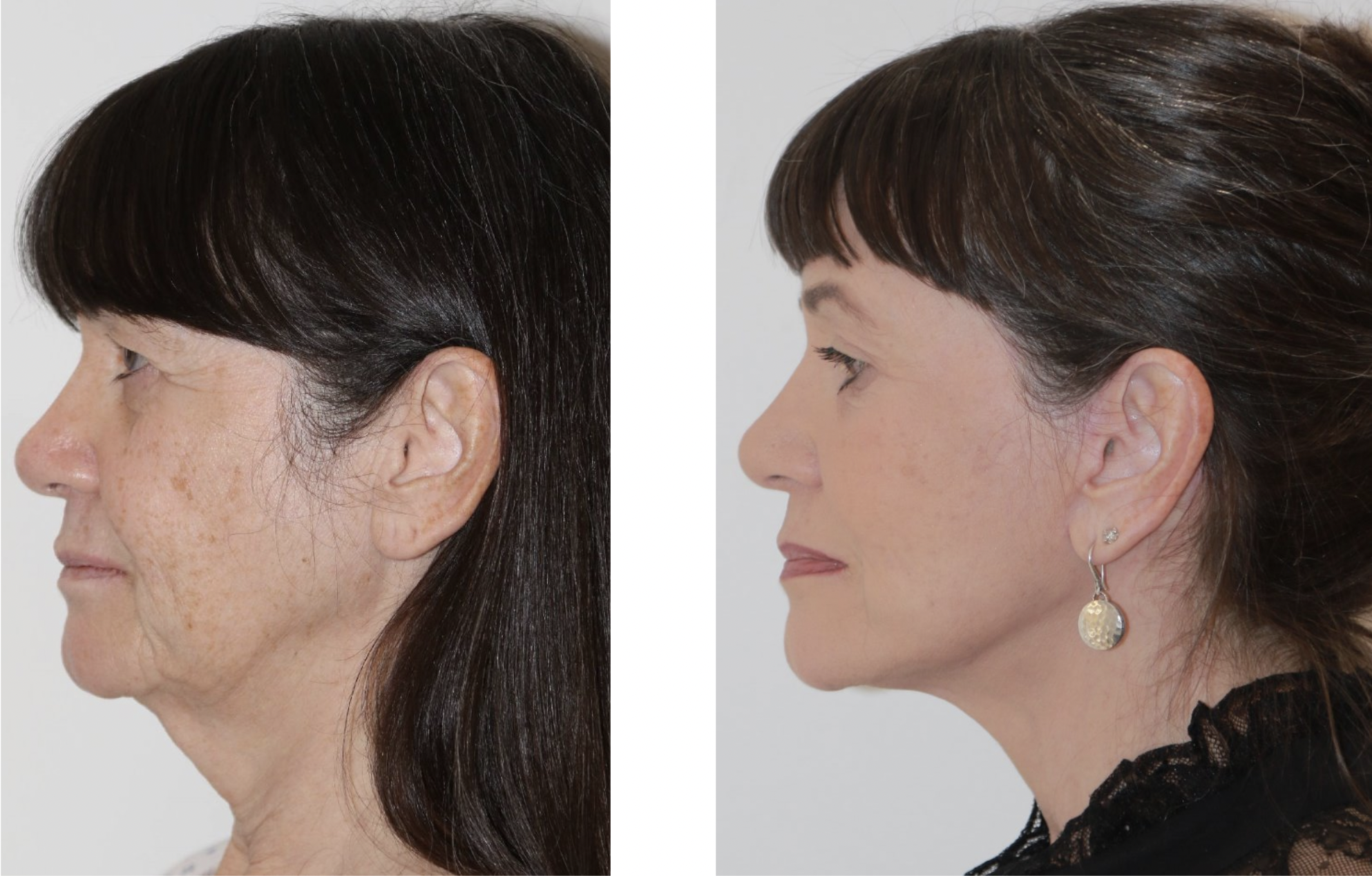
Tracy O - before and after surgery with side by side comparison Age 61.
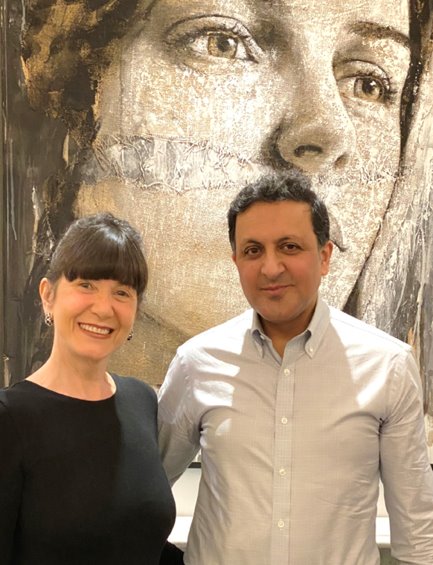
Tracy O - At 3 months after surgery and incredibly happy with her outcome as was Rajiv. Tracy is an absolutely wonderful lady and it is so rewarding to see her confidence shining.
Tracy D recovery journey after Deep Plane Face and Neck lift
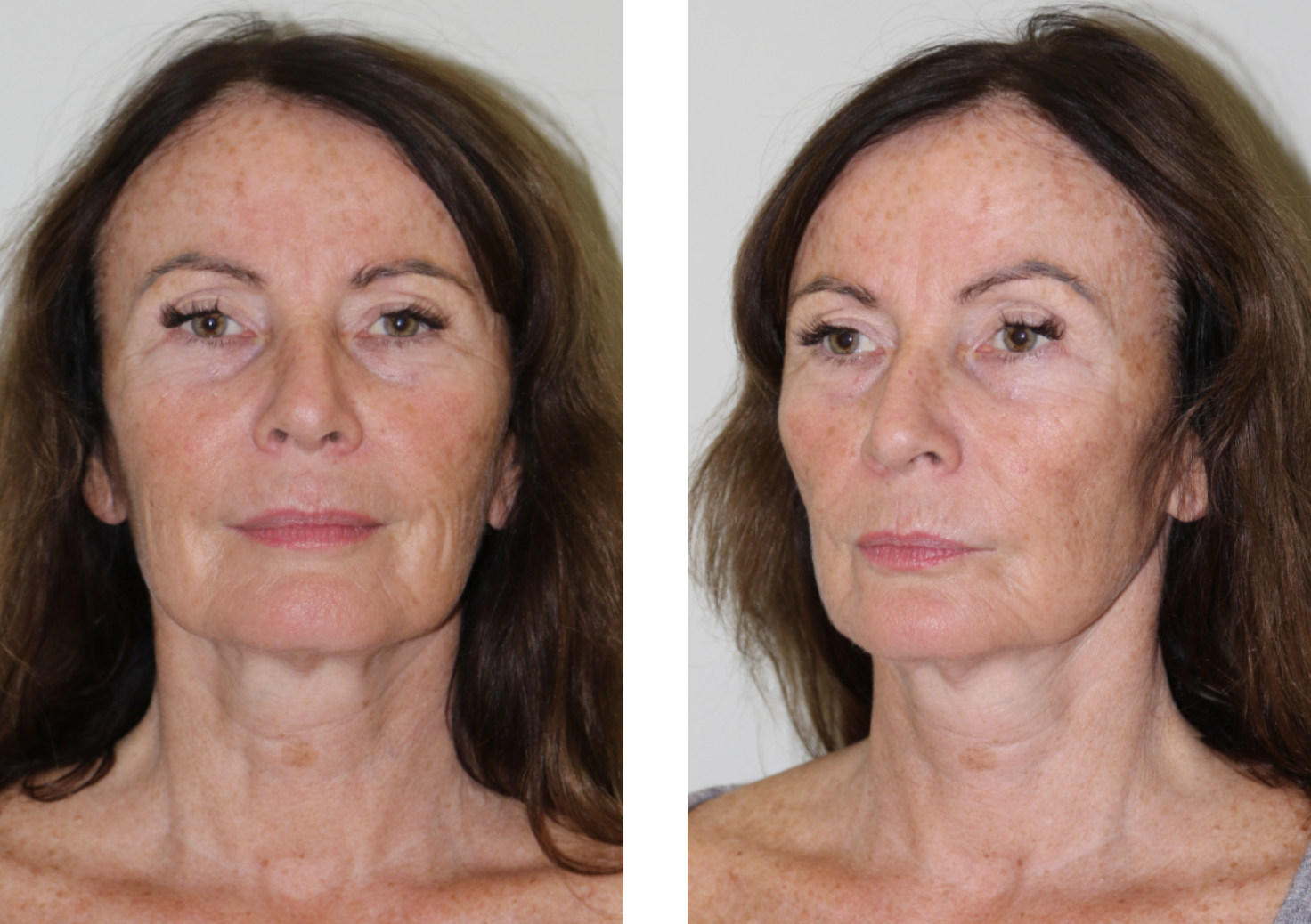
Tracy D – Preoperative appearance on the morning of surgery – Age 60.
She underwent Blepharoplasty and Deep Plane Face and Neck lift with Anterior Platysmaplasty using TIVA light general anaesthetic to reduce bruising and swelling and accelerate recovery. Rajiv performed a facelift for Tracy 14 years previously so this was a secondary facelift. Her 14 year follow up before and after series can be seen in the Face & Neck Lift Journey webpage.
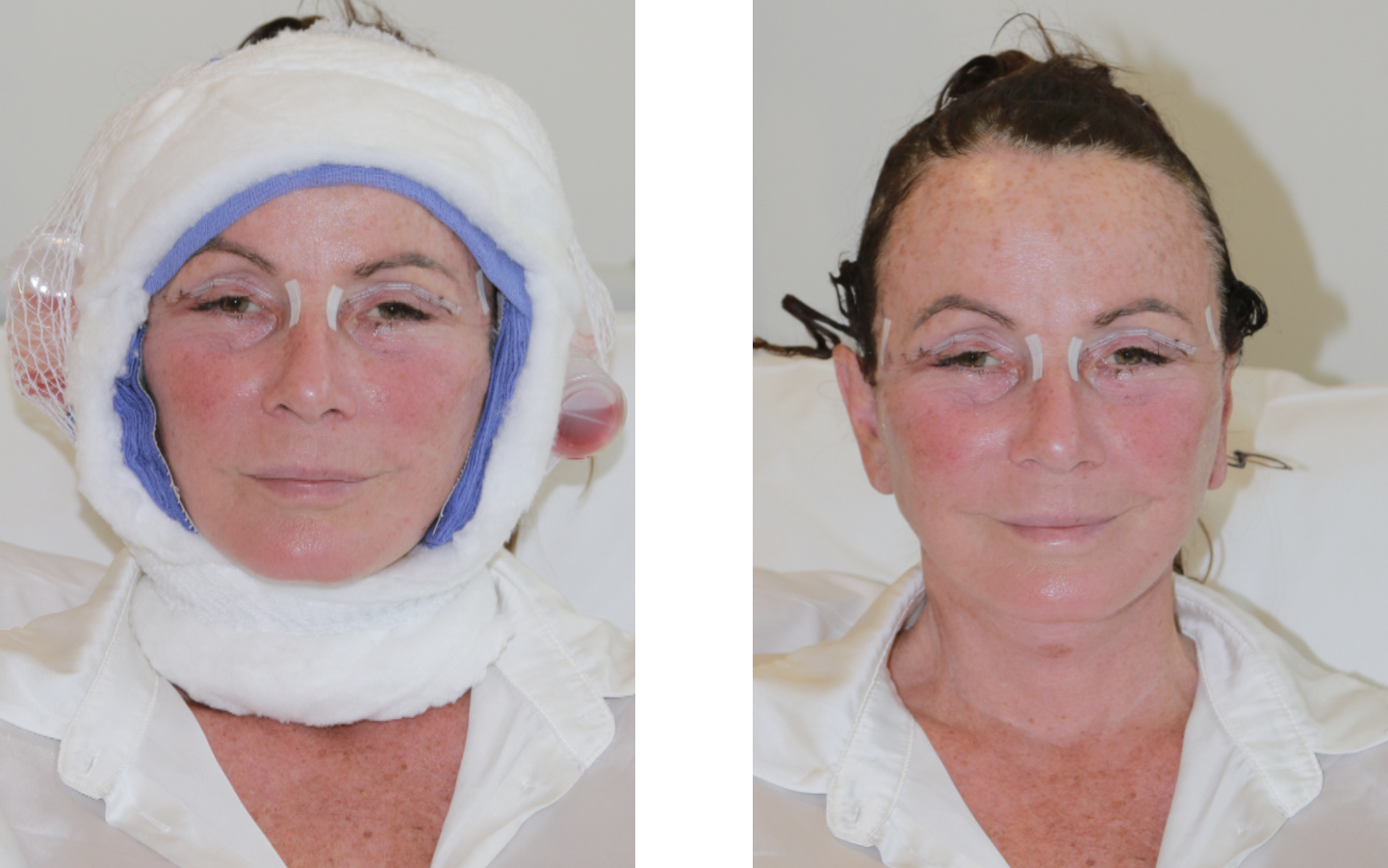
Tracy D on the evening of surgery (Left) with her dressing on and then on Day 1 after surgery (Right) literally just after her dressings were removed prior to her hair wash.
Note her flushed cheeks which is normal on the Day 1 after surgery and settles with cool pads by the next day.
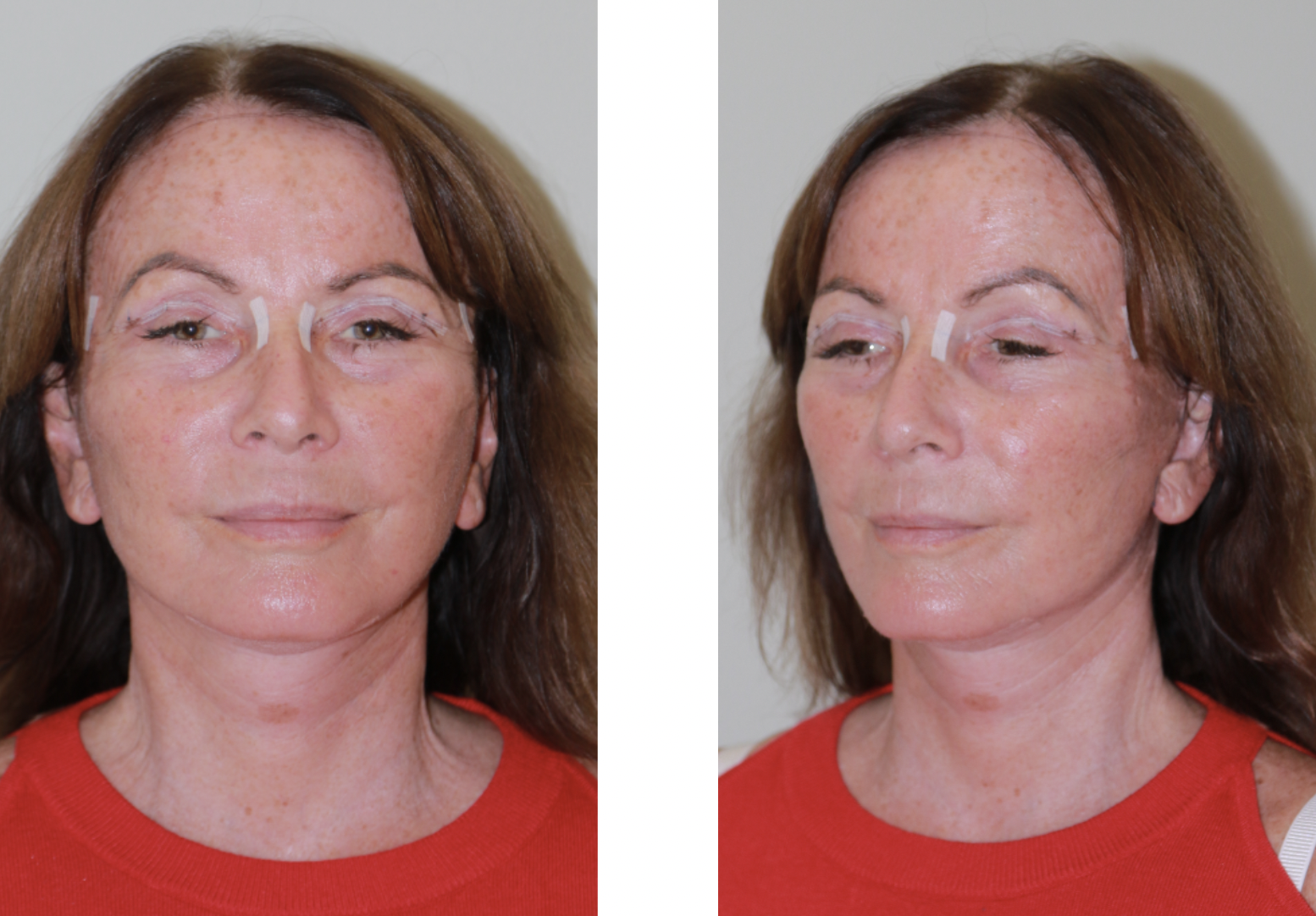
Tracy D Two days after surgery about to leave hospital.
There is a little more swelling by Day 2 which is normal and sometimes can increase a little till Day 3-4 although Day 2 was Tracy’s peak day of swelling. Typically, there is very little bruising with Mr Grover’s Deep Plane Technique but a little swelling is normal.
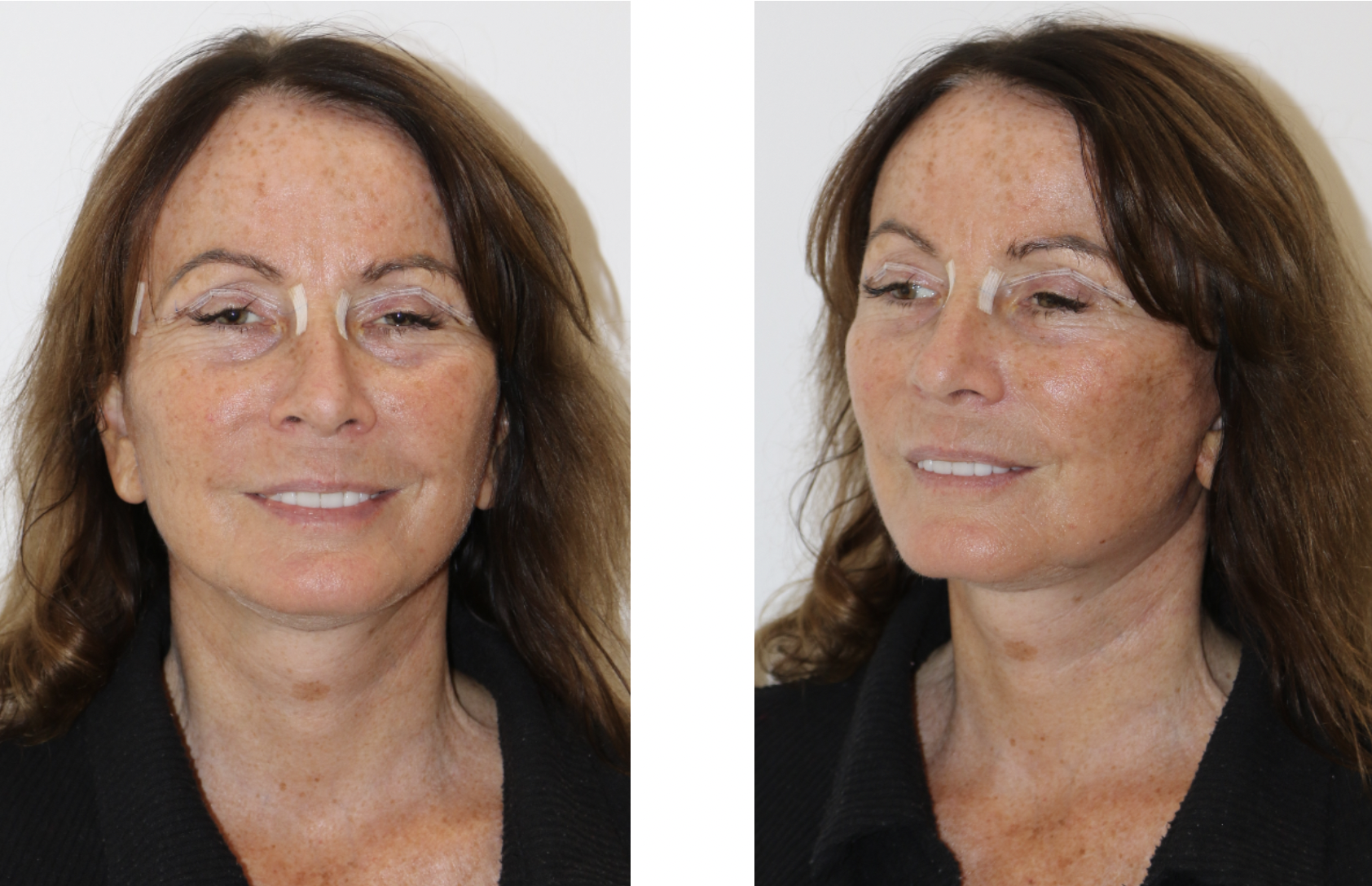
Tracy D - 6 Days following surgery (Left) at the visit where she had suture removal from her eyelids (Right - after eyelid stiches removed).
Swelling is settling well however she will look even better in a 2-3 weeks. Typically, there is little bruising with Mr Grover’s Deep Plane Technique but some swelling is normal. Tracy was going home to have another week of Netflix and Chill until all her facelift stitches were removed at 13 days.
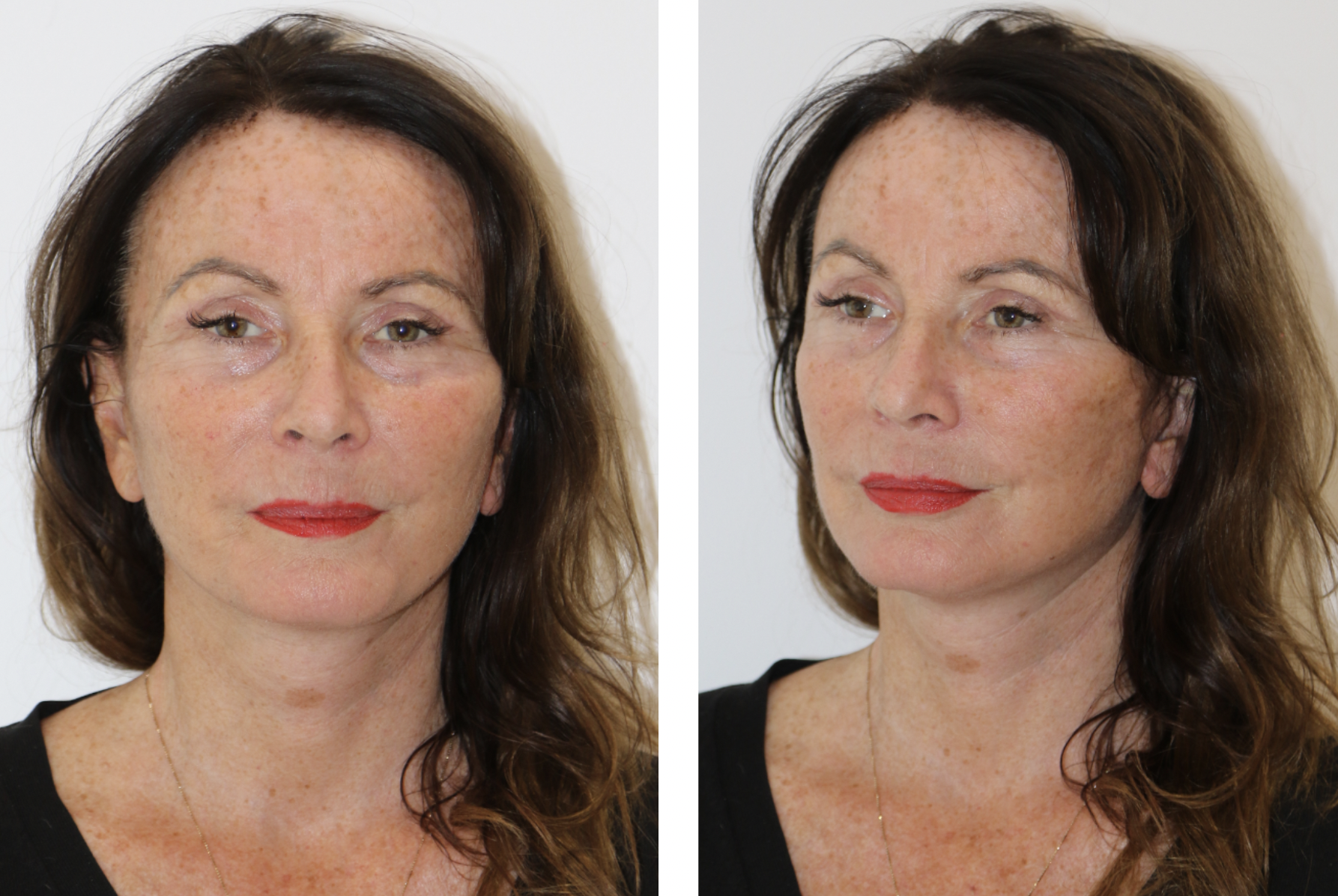
Tracy D - 12 Days after surgery on the visit when she came for facelift stitch removal.
Swelling is settling there is almost no bruising but Tracy will look even better in a week or two. Tracy could go out and about without anyone knowing she had surgery but Mr Grover would still advise not to go for long walks or take exercise till 4 weeks post facelift.
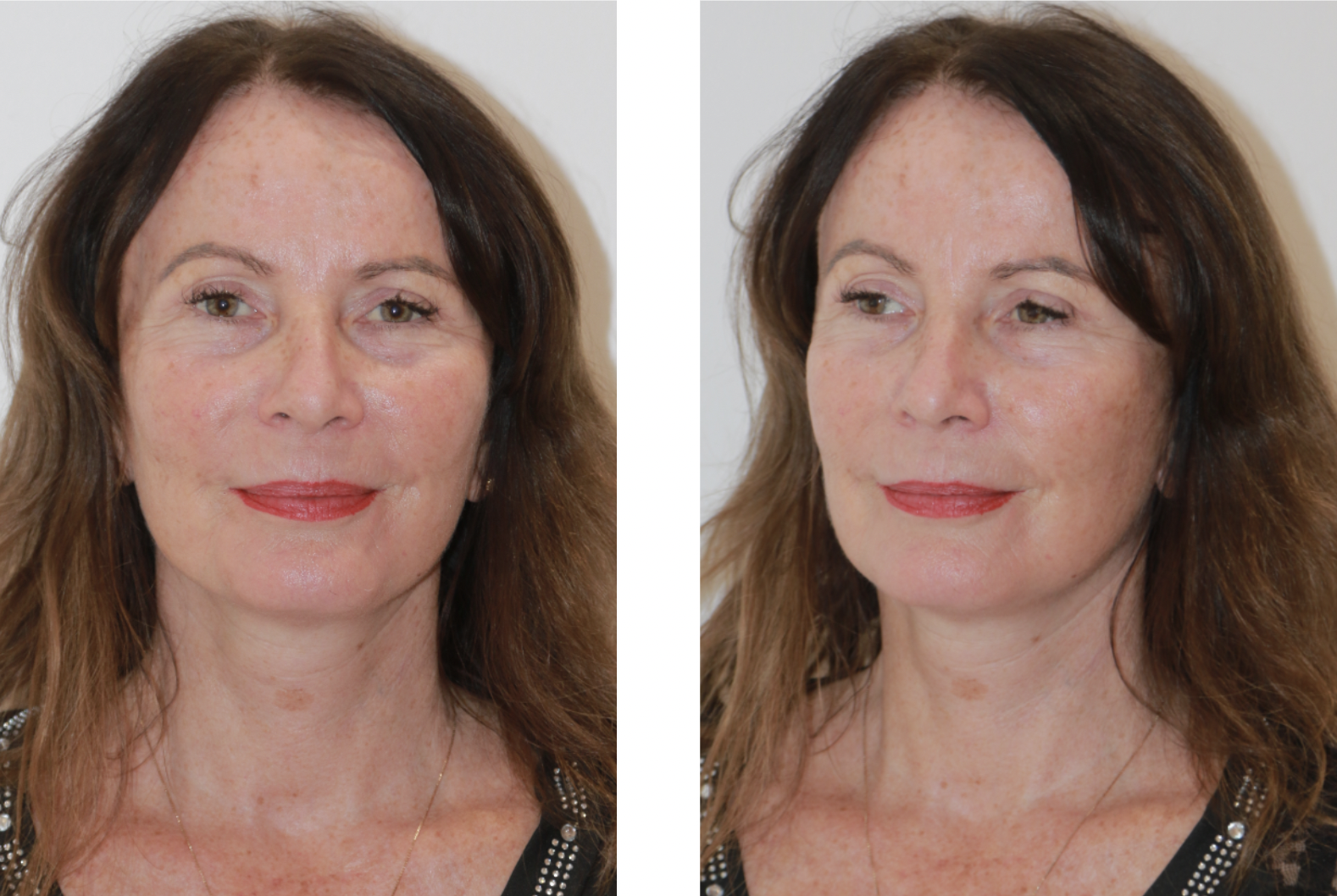
Tracy D – 6 weeks after her operation and no visible signs of surgery just minor swelling still present which settles fully by 2-3 months in most patients.
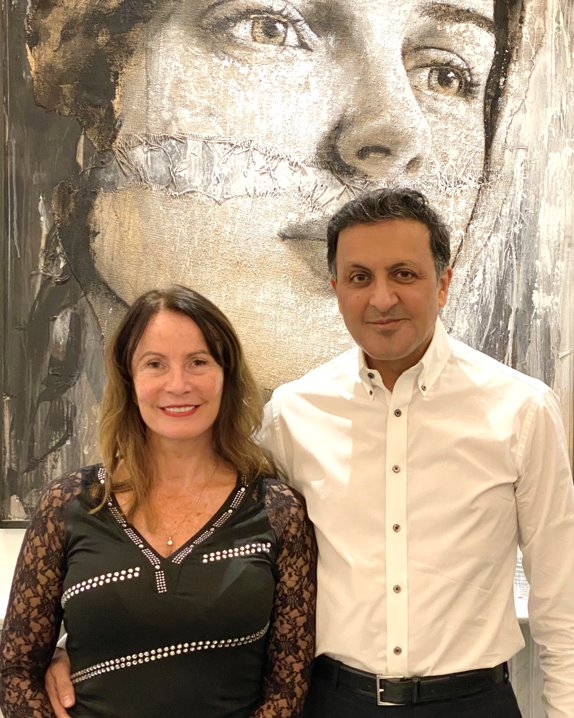
Tracy D - At 3 months after surgery and delighted with her result as was Rajiv.
It was a pleasure looking after Tracy and the most rewarding part of facelift surgery is to see the confidence and visibility it restores.
Conclusion
The key to good recovery is preparation both physically and emotionally. The above guide gives an overview of recovery from deep plane face and neck lift but there is no normal or expected recovery as such, because each face is unique so each patient’s recovery is also unique. Following the instructions is extremely helpful and will really make a difference but please know that you are not alone on your journey. Rajiv and his team specialise exclusively in facelift surgery and are there to hold your hand throughout the process.
